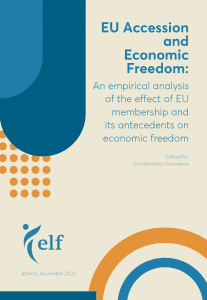• The process of EU accession is associated with increases in economic freedom. The gains of this period are not reducible to the effects of minimum accession standards, and are incremental to the benefits from improvements in domestic regulatory and ad-ministrative practices. Importantly, such gains are deduced from a comparison with not only poorer and less developed countries in the EU neighbourhoods but also with wealthy non-EU OECD countries.
• The key mechanism by which the accession has come to be associated with economic freedom seems to be the freedom to trade, mainly due to the elimination of many types of barriers to trade in goods within the European Union and favourable terms offered to accession candidates, typically as part of an Association Agreement.
• EU accession has a significant association, in the direction of greater economic freedom, with the quality of regulation, the moderation of currency and interest rate manipulation, the effectiveness of the legal system and the protection of property rights. However, progress in each of those areas appears to be more of a pre-requisite of accession than a consequence thereof.
• EU membership is most associated with the Economic Freedom of the World sound money indicator. This effect could be partly a result of price and interest rate stability criteria associated with accession; but it could also be a simple consequence of the linking of EU accession and commitment to Eurozone accession since the Maastrich Treaty of 1992.
• The overall assessment of EU membership in Italy points to a cor-relation between the level of economic freedom in the country and the accession to the European single currency in 1999.
• Coherently, Economic Freedom of the World subcomponents re-lated to inflation and monetary stability, the opening of both domestic and international markets and regulatory harmonization correlate with the policies that European governments had to implement to converge towards the single currency.
• The analysis of economic freedom at the regional level in Italy measured through the Centro Einaudi’s ILERI index (index of the economic freedom of the Italian regions) shows large and also widening differences between territorial areas of the country. Some of them are historically known (i.e. the North-South polarisation), while new ones developed from 2000 onwards, in spite of the extensive cohesion policies deployed in this period.
